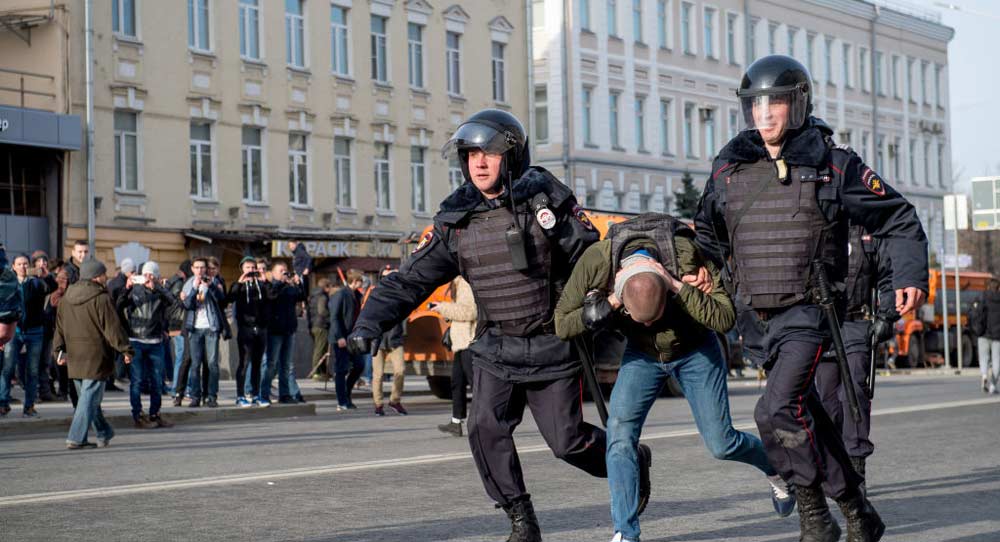Protests that took place in Russia on March 26 and others that began over a month ago in neighboring Belarus are a salutary reminder to European governments and to the EU: they cannot remain on the sidelines by issuing anodyne statements condemning the violence meted out by the security services in the two countries.
This is a chance for the EU to adopt very simple measures that in the long term could have an important impact on the future directions of both countries. This is not wishful thinking. States and societies are not static, as the protests in Belarus and Russia confirm. The demonstrations are different from each other. Nonetheless, a European response need not differentiate.
The protests in Belarus have two characteristics. The first is economic. Living standards in the country are declining. Prices are increasing as subsidies for energy and other household items have been lifted. A so-called parasite tax, under which the regime imposed a hefty fine on those who worked less than one hundred eighty days a year, was the turning point.
Young and old have had enough. Since mid-February, they have been taking to the streets, not only in the capital, Minsk, but also in other cities across the country. Belarusian President Alexander Lukashenko’s security forces made sure early on to detain the main opposition leaders in the hope of deterring the protesters—but to little avail. That shows the sense of desperation of ordinary people.
The second characteristic is the weak role of the opposition, which remains divided, as if it has learned nothing over the past decade or so. Just before he was detained, Mikalai Statkevich, an opposition leader, called on the crowds to gather, regardless of the fact that the opposition had no plan. Footage shown by Radio Free Europe revealed the security forces beating old women and shoving them into police trucks.
So much for Lukashenko’s attempts over the past year to adopt more lenient policies to try to woo the EU for economic and political support. Remaining in power is his priority. The economy, however, is now the president’s Achilles’ heel. The wave of protests confirms his vulnerability. Lukashenko is going to need financial assistance to keep the lid on the unrest.
The protests in Russia are a different story. Report after report tells of young people taking to the streets in dozens of cities. They were too young to participate in the white ribbon demonstrations of 2011–2012 that rattled the Kremlin and were followed by a crackdown.
But now, despite promises by Russia’s President Vladimir Putin to deal with the country’s endemic and pervasive corruption, Russians had only to read opposition politician Alexei Navalny’s investigation into Prime Minister Dmitry Medvedev’s vast wealth—all accumulated allegedly by corrupt means—to get the real picture. Navalny, who wants to run for president in 2018, has been repeatedly detained and fined by the courts.
What is novel about these protests is not only their scale but also their coordination across the country. They show that the Kremlin’s propaganda machine—aimed at brushing aside any problems caused by Russia’s economic downturn, while making Moscow a major geostrategic player, especially in the Middle East—has been dented.
The EU can respond in very direct and simple ways. First, whether through the European Endowment for Democracy, the Brussels-based institutions, or the member states, the union can invest in Belsat, an important satellite TV station that transmits from Warsaw. Belsat is in desperate need of funding. It’s time for the EU to channel funds to the broadcaster.
Second, the EU should step up its support for Internet access in Eastern Europe. Independent news from sources such as the BBC, Deutsche Welle, and Radio Free Europe is a must for countries in the region. And what about a professional EU channel to beam news and investigative reports into the union’s Eastern neighbors? Individuals and civil-society movements trying to get local news out need support as well.
Third, the EU or its member states should fund university places for young Belarusians and Russians and speed up the granting of visas and scholarships. The EU could mobilize its Erasmus student-exchange program. Universities in Vilnius and Warsaw are doing much to help Belarusian students. That support should be much more widespread. And the EU could find ways to fund centers for European studies in Belarus.
Finally, the EU should prepare for the day after. Putin and Lukashenko are not immortal. Believing that their successors will be just as authoritarian as they are, as some argue, is intellectually fateful and lazy. Europeans can invest in supporting Russian opposition individuals such as Mikhail Khodorkovsky who are now living in the West, to build up political movements back home.
None of the above steps is impossible. In fact, they are easy and doable. They are about giving young people options for how to deal with change, how to organize, how to be independent from state propaganda.
All the above, in varying degrees, were done in Communist Central and Eastern Europe before the Berlin Wall was torn down in November 1989. They made a difference. They gave power to the powerless.








